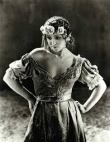




2 March
 Informer (Dir. Arthur Robison, 1929) (Screening format – DCP, 101mins) A technically and artistically sophisticated drama set in Dublin amongst members of a revolutionary party in the newly independent Ireland of 1922. The noir-ish story follows the fateful consequences of jealousy and betrayal when fiery Gypo ‘informs’ on his former comrade Francis, out of misguided suspicion over a girl. With a German/American director, a Hungarian leading lady and a Swedish leading man the international nature of the production was typical of a period in filmmaking unencumbered by dialogue and exhibits hallmarks of a distinctively German style thanks to cinematography by Werner Brandes (‘Piccadilly’) and Lubitsch regular Theodor Sparkuhl. The film was released in both part-talkie and silent versions but this is the superior, silent version, newly restored by the British Film Institute. Find out more at screenonline.org . Presented as part of the New Music Dublin festival. With live musical accompaniment from composer Garth Knox with a six piece ensemble. Studio Stage, NCH, Dublin Link
Informer (Dir. Arthur Robison, 1929) (Screening format – DCP, 101mins) A technically and artistically sophisticated drama set in Dublin amongst members of a revolutionary party in the newly independent Ireland of 1922. The noir-ish story follows the fateful consequences of jealousy and betrayal when fiery Gypo ‘informs’ on his former comrade Francis, out of misguided suspicion over a girl. With a German/American director, a Hungarian leading lady and a Swedish leading man the international nature of the production was typical of a period in filmmaking unencumbered by dialogue and exhibits hallmarks of a distinctively German style thanks to cinematography by Werner Brandes (‘Piccadilly’) and Lubitsch regular Theodor Sparkuhl. The film was released in both part-talkie and silent versions but this is the superior, silent version, newly restored by the British Film Institute. Find out more at screenonline.org . Presented as part of the New Music Dublin festival. With live musical accompaniment from composer Garth Knox with a six piece ensemble. Studio Stage, NCH, Dublin Link
4 March
 Italian Straw Hat (Dir. Rene Clair, 1928) (Screening format – not known, 105mins) A man is on his way to his wedding when his horse eats the hat of a married woman who is having a secret tryst with a soldier, and the hapless groom must replace the chapeau or face the wrath of the lady’s lover. René Clair’s sublime, kinetic farce is set in 1895, at the dawn of the film era, and fondly recalls the techniques of the earliest silents. Pauline Kael called it “one of the funniest films ever made, and one of the most elegant as well.” For years it has
Italian Straw Hat (Dir. Rene Clair, 1928) (Screening format – not known, 105mins) A man is on his way to his wedding when his horse eats the hat of a married woman who is having a secret tryst with a soldier, and the hapless groom must replace the chapeau or face the wrath of the lady’s lover. René Clair’s sublime, kinetic farce is set in 1895, at the dawn of the film era, and fondly recalls the techniques of the earliest silents. Pauline Kael called it “one of the funniest films ever made, and one of the most elegant as well.” For years it has  been difficult, if not impossible, to see the original version of René Clair’s masterful The Italian Straw Hat. Instead, viewers have had to be satisfied with either the alternate version that was released in the United States in 1931, or hybrids that supplement the American version with additional footage. This brand new restoration brings Clair’s original French version to modern audiences using the finest original material possible: the film’s original camera negative and original French title negative, both of which are preserved at the Cinémathèque Française. Find out more at silentfilm.org. Presented as part of the Dublin International Film Festival. With live musical accompaniment by the Guenter Buchwald Ensemble: Matthew Jacobson, Nick Roth, Derek Whyte. Lighthouse One Cinema, Dublin Link
been difficult, if not impossible, to see the original version of René Clair’s masterful The Italian Straw Hat. Instead, viewers have had to be satisfied with either the alternate version that was released in the United States in 1931, or hybrids that supplement the American version with additional footage. This brand new restoration brings Clair’s original French version to modern audiences using the finest original material possible: the film’s original camera negative and original French title negative, both of which are preserved at the Cinémathèque Française. Find out more at silentfilm.org. Presented as part of the Dublin International Film Festival. With live musical accompaniment by the Guenter Buchwald Ensemble: Matthew Jacobson, Nick Roth, Derek Whyte. Lighthouse One Cinema, Dublin Link
15 March
 The Four Horsemen of the Apocalypse (Dir. Rex Ingram, US, 1921) (Screening format not known, 156mins) The Four Horsemen of the Apocalypse is an epic tale of an Argentinean family who becomes divided and ends up fighting on opposite sides during WWI. The film, based on the novel by Vicente Blasco Ibanez, grew into a mammoth production: over $1 million was poured into it and over 12,000 people were involved. Yet the film’s existence can
The Four Horsemen of the Apocalypse (Dir. Rex Ingram, US, 1921) (Screening format not known, 156mins) The Four Horsemen of the Apocalypse is an epic tale of an Argentinean family who becomes divided and ends up fighting on opposite sides during WWI. The film, based on the novel by Vicente Blasco Ibanez, grew into a mammoth production: over $1 million was poured into it and over 12,000 people were involved. Yet the film’s existence can  be traced back to one woman, June Mathis. As the head of Metro’s script department, Mathis, realizing the film potential of the best-selling novel, persuaded then-president Richard Rowland to buy the rights. She also
be traced back to one woman, June Mathis. As the head of Metro’s script department, Mathis, realizing the film potential of the best-selling novel, persuaded then-president Richard Rowland to buy the rights. She also  convinced the studio to hire Ingram on as director; realizing her passion for the project, Metro also gave her screenwriting duties. As the final coup de grace, Mathis insisted on casting an unknown actor in the featured role of Julio. In a 1921 interview with famed columnist Louella Parsons, Valentino says of Mathis, “She discovered me. Anything I have accomplished I owe to her, to her judgment, to her advice and to her unfailing patience and confidence in me.” Mathis had spotted Valentino in a bit part in the film Eyes of Youth (1919), and her instincts told her he was a star. Those instincts resulted in one of the most successful films of its time, grossing over $4 million, and catapulted “The Great Lover” into cinematic history as the first screen idol. Find out more at silentfilm.org. With live musical accompaniment by by Barry Adamson, Matthew Nolan, Seán Mac Erlaine, Adrian Crowley, & Kevin Murphy. St. Patrick’s Cathedral, Dublin Link
convinced the studio to hire Ingram on as director; realizing her passion for the project, Metro also gave her screenwriting duties. As the final coup de grace, Mathis insisted on casting an unknown actor in the featured role of Julio. In a 1921 interview with famed columnist Louella Parsons, Valentino says of Mathis, “She discovered me. Anything I have accomplished I owe to her, to her judgment, to her advice and to her unfailing patience and confidence in me.” Mathis had spotted Valentino in a bit part in the film Eyes of Youth (1919), and her instincts told her he was a star. Those instincts resulted in one of the most successful films of its time, grossing over $4 million, and catapulted “The Great Lover” into cinematic history as the first screen idol. Find out more at silentfilm.org. With live musical accompaniment by by Barry Adamson, Matthew Nolan, Seán Mac Erlaine, Adrian Crowley, & Kevin Murphy. St. Patrick’s Cathedral, Dublin Link
NB. Whilst every effort has been taken to ensure that the information contained in these listings is accurate, silentfilmcalendar.org can take no responsibility for any errors or inaccuracies. You are strongly advised to confirm with the venue that the event remains as detailed, particularly if traveling any distance to attend.
